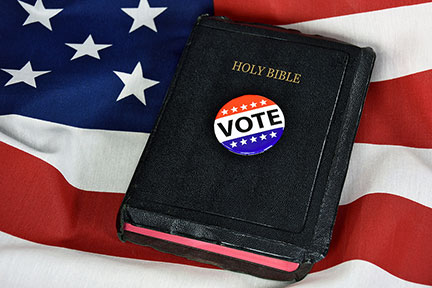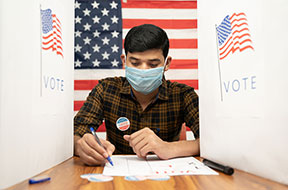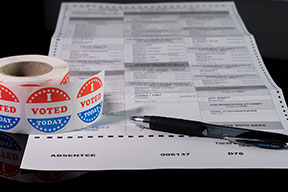Election Safety and Should Christians Vote?

In the Bible
“Behold, I am sending you out as sheep in the midst of wolves, so be wise as serpents and innocent as doves" (Matthew 10:16).
- We are to be both wise (careful) and innocent.
"I have given them your word, and the world has hated them because they are not of the world, just as I am not of the world" (John 17:14).
- As Jesus' followers, we are not of the world.
Jesus said to them, “Render to Caesar the things that are Caesar's, and to God the things that are God's” (Mark 12:17).
- The question in our country today is, "Who is Caesar?"
But seek the welfare of the city where I have sent you into exile, and pray to the Lord on its behalf, for in its welfare you will find your welfare (Jeremiah 29:7).
- Jeremiah urged the exiles to be good citizens wherever they were. We, as citizens of God's Kingdom ought to work for the welfare of the earthly nation where we live.
Gaius, who is host to me and to the whole church, greets you. Erastus, the city treasurer, and our brother Quartus, greet you (Romans 16:23).
- Erastus, a Christian, was a city official in Corinth, either Treasurer or Director of Public Works.
In the News
This election cycle has been definitely different. Civil unrest has been added to the hindrances of a global pandemic with widespread restrictions. All of this continues right up to Election day. There are two questions for us:
- How can we stay safe while voting or hosting a polling place?
- Should Christians vote or not vote?
Safety During the Election

busy inside the polling booth
If we are voting in the election, are we in danger of being exposed to a contagious virus, or of exposing others? If so, how do we protect ourselves and others? This may be a no-brainer for some who have already determined their views on this. Others, though, are still not settled on the matter. However, we can almost certainly count on polling places marked for social distancing with booths six feet apart and floors marked for where to stand in line. Voters in most places will be asked to wear face coverings. Even if you have doubts as to the effectiveness of wearing a mask or face shield, there are other people in the polling place. If you can safely wear one (some cannot for medical reasons), it will put other voters at ease. Alternatives to in-person voting are mailing in or dropping off an absentee ballot.
If your church is a polling place, you can make it a safer place. Besides clearing tripping and slipping hazards, we can intensify sanitation. Clean all touched surfaces frequently. If voters see church staff or volunteers sanitizing, it will assure them of this being a safe place. It will also leave a good impression in the community.
There is another potential threat to safety - civil unrest. There are a few elements who have threatened to disrupt voting in certain areas. If you are going to a polling place, be watchful. If your church is a polling place, have Safety Team members there to respond if needed. At least two should be on site. If one is responding to a situation, the other can call 911. If a law enforcement officer can be present, that is so much better.
Should Christians Vote?

For many centuries there has been a tension among Christians concerning political participation, such as holding public office, working for a government agency, serving in the military or law enforcement, and voting. Each side has biblical arguments for their stand. Some are in the middle, uncertain of what to do.
Reasons Why Some Christians Don't Vote
Although the most common reasons for Christians not voting are similar, there are some distinctions. Objections to voting and non-participation in public office center on the division of sovereignty. God's sovereignty is over all creation, while human sovereignty is divided among nations. Here are the derived objections to voting:
- Citizenship -
Christians are citizens of heaven, therefore not of any nation state or empire. Their allegiance should be to God alone.[1]
- Not of this world -
Jesus said, "You are not of the world, but I chose you out of the world" (John 15:19). Since we are not of this world, we have no part of it, and that includes voting.
- Participation is love of the world -
John wrote, "Do not love the world or the things in the world. If anyone loves the world, the love of the Father is not in him" (1 John 2:15). Those against or skeptical of voting say it is what those who love the world do.
- Separation -
Some argue that Christians should separate themselves from the world. They cite 2 Corinthians 6:17: "Therefore go out from their midst, and be separate from them, says the Lord, and touch no unclean thing; then I will welcome you."
On the other hand, there are many Christians who have low awareness or little interest in who governs this country, their states, and their local jurisdictions. Some are simply dismissive of politicians in general, citing corruption and false promises, while there are others who naïvely trust all public officials.
Reasons Why Some Christians Do Vote
There are reasons why Christians may vote. There are also reasons why they should vote. The Gospel Coalition has a good article on this.[2] There are also additional reasons.
- Old Testament Examples -
First of all, we acknowledge that when the Bible was written, citizens did not vote except in Athens and Rome, and that was when the biblical authors were not there. However, Old Testament saints were involved in governmental affairs, and not always in Israel or Judah. Joseph was Prime Minister of Egypt. Daniel, Mordecai, and Nehemiah held high offices in Babylon and Persia.
- New Testament Examples-
In the New Testament, Jesus' followers included the wife of one of Herod's officials and two members of the Sanhedrin. An early convert was a high official in Ethiopia. Other converts who retained their positions were Sergius Paulus, Governor of Cyprus, and Erastus, City Treasurer of Corinth. The Bible in general and the New Testament in particular do not forbid Christians from holding public office, but the examples given seem to approve of it.
- God Granted Government-
Government itself is not evil. In Romans 13, Paul says it was established by God to reward good, protect the people, and punish crime. This is what we naturally expect from government today. Any corruption that exists in government is because it is a human institution, and human nature is corrupt. Nevertheless, God expects governments to do their job. Human rulers eventually answer to God.
- Caesar's Due-
In Matthew 22:21 and Mark 12:17, answering a question about taxes, Jesus said, "Render to Caesar the things that are Caesar's." Both Peter and Paul urged us to honor and pray for civic leaders at all levels. At that time, the Roman Empire was ruled by the Caesars.
Applying what Jesus told the Pharisees means paying what's due to whoever is the sovereign of your country. In the United States, who is the sovereign? It is not the President, the top officer in Congress, or the Chief Justice of the Supreme Court. The Constitution of the United States clearly states who the sovereign is when it begins with "We the people."
Since We the People (that is us) are the Sovereign of the United States, this means that we are charged with the responsibilities of the sovereign. The Constitution states what our primary responsibility is as Sovereign: appointing the officials of the republic. The Constitution also states how we do that. Members of the House of Representatives are chosen by the citizens in their districts. Senators were chosen by the state legislators (who are chosen by the people), but are now chosen directly by the citizens. The Electors in the Electoral College, who choose the President, are chosen by the citizens of each state. We choose these by voting.
Also, since each state is to be a republic, then We the People appoint the legislatures and governors of our respective states, and we also appoint our local officials. According to this view, in the United States We the People are the Sovereign, and we are expected to carry out our primary responsibility, which is to elect our chief officials from the President on down to the city council and the school board, it is therefore our sovereign duty to vote.
Conclusion
Should Christians vote? The Bible neither expressly forbids nor discourages it, but it does say that we are citizens of Heaven and are not of the world. It can be argued that the passages cited for non-participation in politics really apply to moral and spiritual issues, such as avoiding idolatry and its practices.
On the other hand, the Bible has many examples of believers involved in the politics of their day with God's blessing. Government was instituted by God, and we are to honor it. The sovereigns of nations answer to God for how they carry out their responsibilities.
It comes down to how each of us decides what we must do. It's your decision. Whatever you decide, be careful and stay safe.
References
- David C. Pack, "Should Christians Vote?" The Restored Church of God, no date [https://www.jw.org/en/jehovahs-witnesses/faq/political-neutrality/].
- Micah Watson, "Why Christians Should Vote," The Gospel Coalition, November 3, 2014 [https://www.thegospelcoalition.org/article/why-christians-should-vote/].




